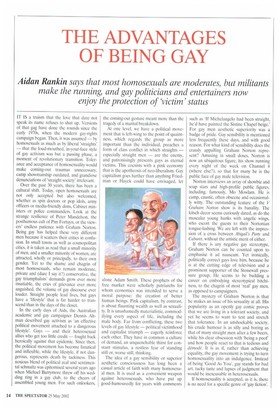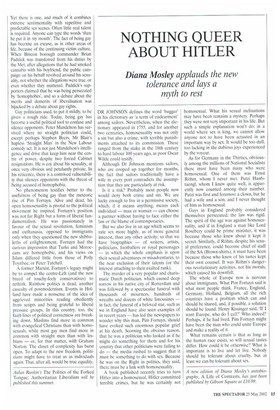THE ADVANTAGES OF BEING GAY
Aidan Rankin says that most homosexuals are moderates, but militants
make the running, and gay politicians and entertainers now enjoy the protection of 'victim' status
IT IS a truism that the love that dare not speak its name refuses to shut up. Versions of that gag have done the rounds since the early 1970s, when the modern gay-rights campaign began. Then, it was assumed — by homosexuals as much as by liberal 'straights' — that the loud-mouthed, in-your-face style of gay activism was but a passing phase, a moment of revolutionary transition. Tolerance and acceptance of homosexuality would make coming-out traumas unnecessary, camp showmanship outdated, and grandiose denunciations of 'straight society' irrelevant.
Over the past 30 years, there has been a cultural shift. Today, open homosexuals are not only accepted but also welcomed, whether as spin doctors or pop idols, army officers or media-friendly dons, Cabinet ministers or police commanders. Look at the strange resilience of Peter Mandelson, the posthumous cult of Pim Fortuyn, or the viewers' endless patience with Graham Norton. Being gay has helped these very different men because it scatters their critics in confusion. In small towns as well as cosmopolitan cities, it is taken as read that a small minority of men, and a smaller minority of women, are attracted, wholly or principally, to their own gender. Yet to the shame and chagrin of most homosexuals, who remain moderate, private and (dare I say it?) conservative, the gay triumphalists' demands grow ever more insatiable, the cries of grievance ever more anguished, the volume of gay discourse ever louder. Straight people lead lives, but gays have a 'lifestyle' that is far harder to transcend than in the days of the closet.
In the early days of Aids, the Australian academic and gay campaigner Dennis Altman described gay activism as 'an effective political movement attached to a dangerous lifestyle'. Gays — and their heterosexual allies who get too little credit — fought back heroically against that epidemic. Since then, the political movement has become fanatical and inflexible, while the lifestyle, if not dangerous, represents death by tackiness. This noxious blend of political zeal and sentimental schmaltz was epitomised several years ago when Michael Barrymore threw off his wedding ring in a gay club, to the cheers of assembled young men. For such onlookers, the coming-out gesture meant more than the tragedy of a marital breakdown.
At one level, we have a political movement that is left-wing to the point of quaintness, which regards the group as more important than the individual, preaches a form of class conflict in which straights — especially straight men — are the enemy, and patronisingly presents gays as eternal victims. This coexists with a pink economy that is the apotheosis of neo-liberalism. Gay capitalism goes further than anything Friedman or Hayek could have envisaged, let
alone Adam Smith. These prophets of the free market were scholarly patriarchs for whom economics was intended to serve a moral purpose: the creation of better human beings. Pink capitalism, by contrast, is about flaunting wealth as well as sexuality. It is unashamedly materialistic, commodifying every aspect of life, including the male body. Far from conflicting, these two levels of gay lifestyle — political victimhood and capitalist triumph — eagerly reinforce each other. They have in common a culture of demand, an unquenchable thirst for constant stimulus, a restless fear of standing still or, worse still, thinking.
The idea of a gay sensibility or superior aesthetic consciousness has long been a casual article of faith with many homosexual men. It is used as a convenient weapon against heterosexuals, who have put up good-humouredly for years with comments such as 'If Michelangelo had been straight, he'd have painted the Sistine Chapel beige.' For gay men aesthetic superiority was a badge of pride. Gay sensibility is mentioned less frequently these days, and with good reason. For what kind of sensibility does the crassly appalling Graham Norton represent? Amusing in small doses, Norton is now an ubiquitous figure, his show running every night of the week on Channel 4 (where else?), so that for many he is the public face of gay male television.
Norton interviews an array of showbiz and soap stars and high-profile public figures, including, famously, Mo Mowlam, He is camp, caustic, often obscene and occasionally witty. The outstanding feature of the V Graham Norton show is its banality. The kitsch decor seems curiously dated, as do the muscular young hunks with angelic wings, who escort the guests to their Nortonian tongue-lashing. We are left with the impression of a cross between Abigail's Patty and Cabaret, without the artistic merit of either.
If there is any negative gay stereotype, Graham Norton can be counted upon to emphasise it ad nauseam. Yet ironically, politically correct gays love him, because he is at the cutting edge of television and a prominent supporter of the Stonewall pressure group. He seems to be building a career on embodying stereotypical bitchiness, to the chagrin of most 'real' gay men, as opposed to campaigners.
The mystery of Graham Norton is that he makes an issue of his sexuality at all. His popularity as an openly gay comic proves that we are living in a tolerant society, and yet he seems to want to test and stretch that tolerance. In an unshockable society, his crude humour is as silly and boring as that of many straight men after a few beers, while his clear obsession with 'being a poor and how people react to that is tedious and demo& It is as if, rather than achieving equality, the gay movement is trying to turn homosexuality into an indulgence. Instead of being 'Good As You', gay stands for bad art, tacky taste and lapses of judgment that would be inexcusable in heterosexuals.
If homosexuality is accepted. as it is, there is no need for a specific genre of 'gay fiction'. Yet there is one, and much of it combines extreme sentimentality with repetitive and predictable sex scenes. Often little real talent is required. Anyone can type the words 'then he put it in my mouth'. The fact of being gay has become an excuse, as in other areas of life, because of the continuing victim culture. When Brixton borough commander Brian Paddick was transferred from his duties by the Met, after allegations that he had smoked cannabis with his boyfriend, the public campaign on his behalf revolved around his sexuality, not whether the allegations were true, or even whether they mattered. Paddick's supporters claimed that he was being persecuted by 'homophobes', and so a debate about the merits and demerits of liberalisation was hijacked by a debate about gay rights.
Gay politicians used, to put it mildly, to be given a rough ride. Today, being gay has become a useful political tool to confuse and silence opponents. Peter Mandelson has survived where no straight politician could, except perhaps Stephen Byers, Mr Blair's hapless 'Straight Man' in the New Labour comedy act. It is not just Mandelson's intelligence and drive that keep him near the centre of power, despite two forced Cabinet resignations. He is coy about his sexuality, at once very obvious and petulantly private. In his reticence, there is a contrived vulnerability that silences opponents with the threat of being accused of homophobia.
No phenomenon testifies better to the usefulness of being gay than the meteoric rise of Pim Fortuyn. Alive and dead, his open homosexuality is pivotal to the political movement he inspired. Fortuyn's position was not far Right but a form of liberal fundamentalism. He was passionately in favour of the sexual revolution, feminism and euthanasia, opposed to immigrants only when they questioned the new shibboleths of enlightenment. Fortuyn had the curious impression that Turks and Moroccans are homophobic, and his views on Islam differed little from those of Polly Toynbee, or Peter Tatchell.
A former Marxist, Fortuyn's legacy might be to compel the centre-Left (and the new breed of touchy-feely conservatives) to rethink. Rainbow politics is dead, another casualty of postmodernism. Events in Holland have made a nonsense of the idea of aggrieved minorities reading obediently from scripts and being grateful to liberal pressure groups. In this country, too, the fault-lines of political correctness are breaking down. Muslims find more in common with evangelical Christians than with homosexuals, while most gay men find more in common with straight men than with lesbians — or, for that matter, with Graham Norton. The closet of complexity has burst open. To adapt to the new freedom, politicians might have to treat us as individuals again. That, after all, would be true equality.
Aldan Rankin's The Politics of the Forked Tongue: Authoritarian Liberalism will be published this summer.























































































 Previous page
Previous page